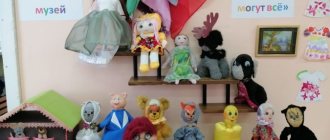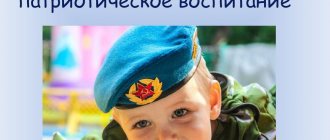MAGAZINE Preschooler.RF
Features of organizing interactive forms of interaction with familyInteractive (English) “interact” mutual, to act.
Main characteristics of “interactive”:
- this is a special form of organization
- all participants are involved in the process of cognition and discussion
- dialogue communication
- each participant makes his own special individual contribution
- domination of either one speaker or one opinion is excluded
- analysis of information heard and circumstances
- respect for other people's opinions is formed
- the participant can abandon his point of view or significantly change it
- participants learn to participate in discussions and communicate professionally
- an indicator of the effectiveness of group activities is the productivity of the group and the satisfaction of group members with joint activities.
Goals of Interaction
- experience exchange;
- development of a common opinion;
- formation of skills and abilities;
- creating conditions for dialogue;
- group cohesion;
- changes in psychological atmosphere
- Non-traditional parent-teacher conference
Rules for organizing interactive training:
All participants are involved in the work.
Psychological preparation of participants.
There should not be many students in interactive technology. The optimal number of participants is 25 people.
Preparing the room for work.
Clear consolidation (fixation) of procedures and regulations.
Pay attention to the division of seminar participants into groups.
Thematic promotions
General Garden Group
Interactive games - as a means of interaction with parents
Four steps to working with interactive games:
Expected results of using interactive forms in working with parents
Increasing parents' interest in the life and activities of the child in the group and the group as a whole
Formation and development of parents’ communication skills and abilities, emotional contacts
Formation and development of analytical abilities
Conclusion
Interaction between family and preschool educational institution
This is a long process, long and painstaking work that requires patience, creativity and mutual understanding from teachers and parents.
Bibliography
- Antipina, G. A. New forms of work with parents in a modern preschool educational institution [Text] / G. A. Antipova // Preschool teacher. - 2011. - No. 12. – P.88 – 94.
- Arnautova, E.P. We are planning to work with our family. [Text]/ E. P. Arnautova. // Management of preschool educational institutions. - 2006. - No. 4. – P. 66 – 70
- Borisova, N. P. Kindergarten and parents. Search for active forms of interaction [Text] / Borisova N. P., Zankevich S. Yu. // Det. garden. control. – 2007. – No. 2. – P. 5-6
- Glebova, S.V. Kindergarten - family: aspects of interaction [Text] / S. V. Glebova, Voronezh, “Teacher” , 2008. – 111 p.
- Davydova, O.I. Competence-based approach in the work of a preschool educational institution with parents [Text] / O.I. Davydova. – St. Petersburg: PUBLISHING HOUSE CHILDREN’S PRESS , 2013. – 128 p.
- Evdokimova, N.V. Kindergarten and family: methods of working with parents. [Text] / N.V. Evdokimova. – M.: Mosaic – Synthesis, 2007. – 144 p.
- Eliseeva, T.P. Kindergarten and family: modern forms of interaction [Text] / T. P. Eliseeva. – Mn.: Lexis, 2007. – 68 p.
- Lebedeva T.V. Interactive forms of working with parents in preschool educational institutions. Electronic resource:
Next >
Interactive forms and methods of work between the class teacher and parents of students
Interactive forms and methods of work between the class teacher and parents of students
Educates everything: people, things, phenomena,
but above all, people.
Of these, parents and teachers come first.
A. S. Makarenko
Modern researchers note the importance of interaction between teachers and parents for the upbringing and development of children. The inclusion of the family as a partner and active subject in the educational environment of a general education institution qualitatively changes the conditions of interaction between teachers and parents who have their own strategic interests in the field of a child’s education. Currently, the problem of the process of interaction between teachers and parents in the educational process can be successfully solved on the basis of unified approaches to planning joint activities, selecting performance indicators, and a unified methodological, organizational, structural and methodological framework. Therefore, as a class teacher, I try to make fullest use of the entire pedagogical potential of traditional forms of interaction with the family, and also look for new, interactive forms and methods of cooperation with parents in accordance with the changing socio-political and economic conditions of the development of our country.
In cooperation with parents, I am based, first of all, on the equality of the partners’ positions, the respectful attitude of the interacting parties towards each other, taking into account their individual capabilities and abilities. I believe that the most important way to realize cooperation between teachers and parents is their interaction, in which parents are not passive observers, but active participants in the educational process. In this regard, I try to use new, interactive forms of cooperation with parents, allowing them to be involved in the process of learning, development and knowledge of their own child.
The word “interactive” came to us from the English language from the word “interact”, where “inter” is mutual, “act” is to act. Interactive means the ability to interact or be in a conversation, dialogue mode with something (for example, a computer) or someone (for example, a person). Hence, interactive forms of interaction are, first of all, a dialogue during which interaction takes place. Interactive methods perform a diagnostic function; with their help, parental expectations, ideas, anxieties and fears are clarified, and since their diagnostic focus is not obvious to the parent, it is possible to obtain information that is significantly less influenced by the factor of social desirability. The use of interactive methods can significantly deepen the teacher’s influence on parents. They gain experience of direct living and reaction, which contributes to the integration of psychological and pedagogical knowledge and skills.
Currently, I am actively using non-traditional interactive forms of working with parents, based on cooperation and interaction between teachers and parents. In new forms of interaction with parents, the principle of partnership and dialogue is implemented. Plan in advance for conflicting points of view on issues of raising children (punishment and rewards, preparation for school, etc.). The positive side of such forms is that a ready-made point of view is not imposed on the participants; they are forced to think and look for their own way out of the current situation.
Unlike parent meetings, which are based on an edifying and instructive form of communication, a family club
builds relationships with family on the principles of voluntariness and personal interest. In such a club, people are united by a common problem and a joint search for optimal forms of helping a child. The topics of the meetings are formulated and requested by parents. Family clubs are dynamic structures. They can merge into one large club or split into smaller ones - it all depends on the theme of the meeting and the plans of the organizers. In my practice, a club meeting, in agreement with the children’s parents, is held once a month (on Saturdays), with or without children. The topics of the meetings concern children and their problems in raising their children. Other specialists are often invited, such as a psychologist, pediatrician, social teacher, etc. We have held family clubs on the following topics: a round table “Mom is the keeper of warmth and the family hearth”, a meeting of the “Healthy Generation” club, a round table “How to teach your child to live in the world of people”, creative workshop “Do as we do, do with us, do better than us!”, family project “Trace of the war in my family”, debate “Family together - the soul is in place”, joint outdoor recreation children and parents.
Using various forms and methods in the work of the club, positive dynamics are noted. Participation in the work of the club helps parents relieve emotional stress - the so-called “generation conflict” that has arisen in both parents and children. There is a desire to make contact with each other, to reconsider established norms in connection with newly emerged circumstances, to respond sensitively to changes in the family climate and move towards its improvement; parents and children learn to hear each other and take the opposite side. The psychological and pedagogical culture of parents is increasing, which in turn contributes to maintaining the integrity of the family and the full development of children in the family, harmonization of family relationships, and the formation of equal and equally responsible partners. In addition, parents and children enrich family leisure with cultural events, thanks to which the family strengthens and unites.
Among the interactive methods that are advisable to use at a traditional parent meeting, one can highlight: workshop, “big circle”, “aquarium”, “round table”, business game, role-playing game, discussion, training, KVN, case-study, moderation, simulation games, master class, joint collective creative activities, work in mini-groups
etc. Let's look at some of the mentioned interactive methods that I use in working with parents.
Workshop
is a method that helps parents develop pedagogical skills in raising children, effectively solving problems that arise in upbringing and teaching, developing the pedagogical thinking of parents, etc. Through a pedagogical workshop, the class teacher can offer parents to find a way out of a conflict situation that may arise during relationships between parents and children, parents and teachers, etc., explain your position in a particular supposed or actually arisen situation.
The workshop can be conducted in a training format. The concept of training has a general collective meaning. The training
is a method of actively training parents, aimed at developing their knowledge, skills and social attitudes. It is advisable to use the training if the planned result is not only the parents receiving new information, but also the application of the acquired knowledge in practice. As part of the training, various methods and techniques of active learning are used: business, role-playing, simulation games, analysis of problem situations and group discussions; handouts, technical training aids. The number of training groups is from 6 to 12 people. The basic principles of the training are confidential and frank communication, responsibility in discussions.
Joint collective creative activities
- an interesting and productive method of activating participants in the parent meeting. At each stage of its implementation, a search is conducted for the best ways to solve a common practical problem that is relevant for all participants in the meeting. It is creative because it cannot turn into dogma or be made according to a template, but is always implemented in various non-standard versions.
Discussion methods are effective and therefore very common within parent meetings.
(
pedagogical discussion or debate, “big circle”, aquarium, round table
, etc.).
Within the framework of a method such as the “big circle”
work is carried out in three stages.
At the first stage, parents sit in a large circle; The teacher creates a problem. At the second stage (lasts approximately 10 minutes), each participant writes down possible ways to solve the problem on a previously prepared sheet of paper. At the third stage, each participant reads out his proposals, the rest listen; after which a vote is taken on each item - whether it is worth including it in the general decision, which is recorded on the board as the conversation progresses, or not. This method is best used if you need to quickly determine ways to solve a problem or its components. A distinctive feature of the debate
is that it allows all participants in the parent meeting to be involved in the discussion of certain problems, and contributes to the development of the ability to comprehensively analyze facts and phenomena, relying on acquired skills and accumulated experience.
The success of the debate, first of all, depends on its preparation. In particular, about a month in advance, parents need to be introduced to the topic of the future debate, the main issues, and literature. The most important part of the dispute is the actual conduct of the dispute. At this stage, the success of the debate is determined by the skill of the presenter (it can be the class teacher or one of the parents with well-developed communication skills and knowledge of the material). It is necessary to establish a speech schedule for participants in advance and then strictly adhere to it, listen carefully to all speeches, competently argue your position, and at the end of the debate sum up the results and draw conclusions. The main principle of the dispute is respect for the position of any participant and a willingness to listen to him. The topic of the debate can be any controversial situation related to the psychological and pedagogical problems of schoolchildren: “Private school - pros and cons”, “Choosing a profession - whose business is it?” “Aquarium”
is a type of discussion method in which parents are invited to discuss the problem “in front of the public.”
Parents are divided into small groups, in small groups one representative is selected, whom the rest trust to conduct a dialogue on the problem discussed at the meeting. The rest of the students act as spectators. Thanks to this option for holding a meeting, parents have the opportunity to see from the outside how other participants react to someone else’s thought; how to resolve a brewing conflict; how they argue their point, and so on. The “round table”
is held with the aim of developing a common opinion among parents on the problem under discussion.
Usually one to three questions are thought out on an issue that is relevant to all participants. Organizing this type of meeting requires placing tables around the perimeter of the room. The presenter (class teacher) determines his place so that he can see all the participants. Invited specialists, representatives of the administration, etc. can take part in the round table. Each issue of the selected problem is discussed separately. The presenter sums up each issue, summarizes everything that has been said and proposes a version of the general position, taking into account comments, additions, and amendments. Very common interactive methods for conducting parent-teacher meetings are games. In particular, role-playing
is a method of collective creative activity aimed at studying and subsequently developing the level of formation of pedagogical skills of participants in the parent meeting.
Approximate topics for role-playing games with parents could be the following: “The child’s homework,” “The child has come home from school,” “Family council,” etc. The methodology for conducting a role-playing game involves determining the topic, the composition of the participants, the distribution of roles between them, and preliminary discussion of possible positions and behavior options of participants. In this case, it is important to play out several options (positive and negative) for the behavior of the participants and, through subsequent discussion, choose the optimal course of action for the problem being considered in the game situation. The “business game”
is effective if parents have sufficient knowledge of the problem being solved.
There are such types of business games as: - managerial (reproduction of specific management functions); — research (connection with research work, study of educational and educational methods through play); — organizational and active (modeling of previously unknown content of activity on a specific topic); — training games (exercises that reinforce certain psychological and pedagogical skills); — projective (development of one’s own project, algorithm of actions, action plan with subsequent protection of the developed one). Imitation games
are a method focused on reproducing (simulating) psychological and pedagogical situations (for example, decision making, redistributing resources) in order to study and master them by meeting participants. Imitation games are usually planned in such a way that parents actively participate in them. This circumstance is due to the fact that every game contains a constructive conflict. In fact, it is decided in a playful way by parents and teachers. As mentioned above, after the meeting, you can discuss individually with parents about their children's concerns. In addition, individual thematic consultations are promising. Often, in solving a particular complex problem, a teacher can get help directly from the parents of students, and this should not be neglected. Consulting with parents is beneficial both for them and for the teacher. Parents get a real idea of the child’s school affairs and behavior, and the class teacher gets the information he needs for a deeper understanding of the problems of each student.
Thus, the class teacher needs to constantly look for the most appropriate forms, methods and techniques of pedagogical interaction with the families of schoolchildren. The interaction of the class teacher with parents is a multidimensional pedagogical problem, to solve which it is necessary to combine the efforts of both the teacher and parents. With the help of school, parents should see positive examples of raising children in the family, learn to see their mistakes and prevent them. Parents should see in teachers people programmed not to destroy, but to create, both the personality of the child himself and the family of his student.
List of used literature
1. Anokhina G. M. Modernization of the model of the educational process in schools and pedagogical universities in accordance with the requirements of the Federal State Educational Standard // Pedagogical education in Russia. 2014. No. 4. P.167-171.
2. Arnautova E. P. Methods of enriching the educational experience of parents. M.: Preschool education, 2013. 247 p.
3. To help the class teacher. Mn.: LLC “Classico-print”, 2003. 120 p.
4. Dubrova V.P. Interaction between teachers and parents. Mn.: Phoenix, 2008. 57 p. 20.
5. Eremina R. A. Functions and main directions of activity of the class teacher: textbook. manual for university students. M.: Humanitarian, ed. VLADOS center, 2008. 183 p.
6. Peskova M. E. Parent meeting - interactive game “If a child is not like everyone else...” // Social network of educators [Electronic resource]. URL: https://nsportal.ru
7. Rozhkova M.I. To the class teacher. M.: Education, 2009. 280 p.
8. Rozhkov M.I. Theory and methods of education. M.: Vlados-Press, 2012. 384 p.


